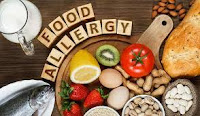Top 5 Ways to Fight against Food Allergy
Food Allergy usually is caused if the immune
system of a body makes a mistake any ingredient in consuming food. Mostly,
protein is the defense of human body making special compound named “antibody”
to fight against “foreign bodies”. Food allergic effect happens when internal
antibodies fight against food protein that has the sensitivity to antibodies.
How to Fight against Food Allergy?
Researchers have suggested that the foods and supplements
are healthy for the heart, including fresh tomatoes, apples, oranges, grapes,
nuts, can fight against food allergy. Read about some other foods below that
help relieving allergy:
1. Vitamin C
The great wonder of nature is Vitamin C. It’s a natural
antihistamine and this vitamin with the property of water-soluble has more
other better functionalities for the human body. Moreover, it’s an antioxidant
to fight against free radicals for the collagen’s synthesis. These free
radicals are responsible for food allergy. So, it’s that kind of vitamin to
live without it is truly impossible.
Foods of enriched of vitamin C must be eaten fresh
because they lose the natural strength being exposed to boiled, air, stored for
a long time, or processed. You can get vitamin C from the following foods and
vegetables, including white and green cabbage, papayas, strawberries,
cauliflower, mango, mustard greens, broccoli, green sweet peppers, kale,
guavas, etc. These all are full of vitamin C.
2. Probiotics
According to Dr. William Silvers, MD, allergy specialist,
“probiotics are the proven provider of both anti-allergic and
anti-inflammatory effects, particularly, at the time of breastfeeding and
pregnancy.” The latest research is published in the “British Journal
of Dermatology” that the mothers who are drinking milk with a probiotics
supplement at the time of and the time after pregnancy are able
to cut the chances to develop eczema along with allergic conditions
to their babies.
Moreover, an Italian study has suggested that children of
age group 2-5 having the problem of allergic rhinitis and drank
milk with probiotic Lactobacillus casei are experiencing fewer
allergic problems those who drank other drinks.
3. Flavonoids
Flavonoids like quercetin are from the plant
pigments, which is widely responsible for various colors of vegetables,
flowers, and fruits. The natural antihistamine of Quercetin helps to
make stable mast cells to protect from releasing and producing antihistamine
along with the compounds of allergic & inflammatory. The better sources of
to get quercetin are berries, legumes, lettuce, broccoli, tea, tomatoes,
apples, parsley, onions, garlic, citrus fruits, etc.
4. Foods Enriched of Vitamin E
According to the study of Michigan State University, the
animals that have been gamma-tocopherol (Vitamin E) before of heavily
polluted breathing air had inflammation less in the measure through their
passages of a nose than those has not provided the gamma-tocopherol, a
report says. It also reduces allergic conditions by getting regularly.
5. Fatty Acids (Omega-3)
The fatty acids of Omega-3 are helping
to cut food allergy and inflammation. They are
recommended for taking to fight against allergic conditions and can
be found in fishes of cold-water, walnuts, grass-fed meat, canola oil
and flax-seed oil.
It’s a very common and irritating problem for our body; we
can these Top 5 Ways to Fight against Food Allergy. These foods are safe
and most recommended for the persons who are experiencing this problem.

Comments
Post a Comment